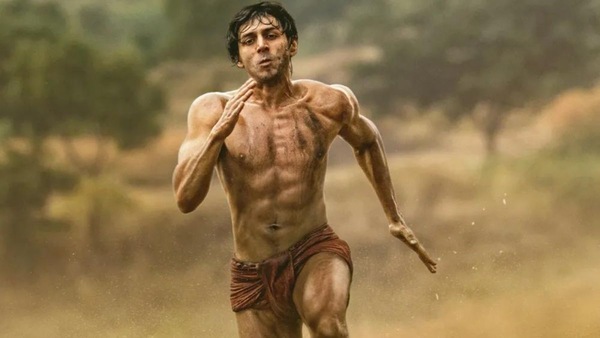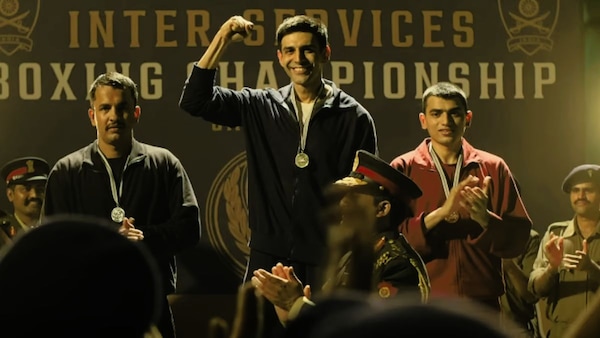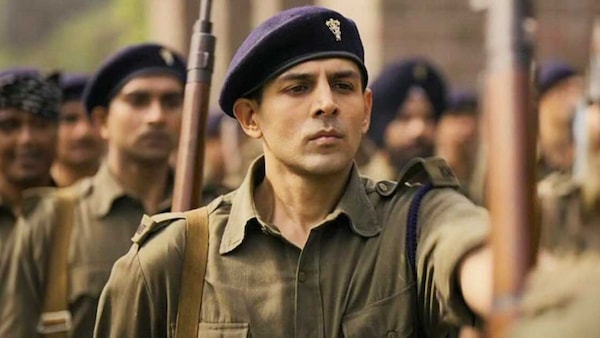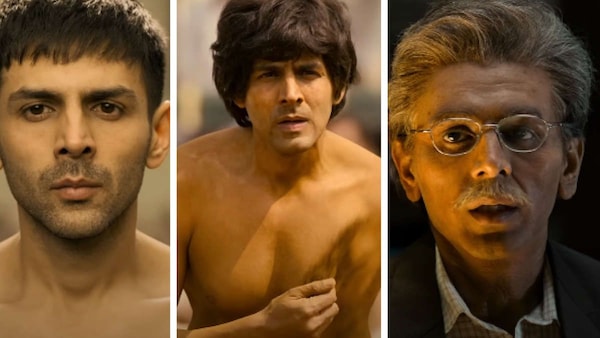Chandu Champion: Kabir Khan Makes An Exceedingly Watchable Biopic
In Chandu Champion, Khan infuses the tested arc of an underdog emerging as a champion with affecting writing, compelling performances and technical bravado, reviews Ishita Sengupta.

Still from Chandu Champion. YouTube screengrab
Last Updated: 04.46 PM, Jun 14, 2024
KABIR KHAN’s Chandu Champion could have been made in a number of different ways and none would come close to the way it is actually done. Consider the story. It is a biopic of Murlikant Petkar, a Paralympic gold medalist in swimming in swimming who fought against humble beginnings, formidable opposition on the field, and an unyielding fate to achieve the distinct honour that he did. A Hindi film on such a subject, especially in a hyper-nationalist climate like now, would mean certain things: any excuse to show the tricolour flag, any excuse for the national anthem to score rousing moments, any excuse to spout nationalistic dialogues, any excuse to stage a scene where the protagonist is pitted against an athlete from Pakistan to amp up climactic tension. Khan’s film does none of the above and in doing so, redeems the genre of biopic from the clutches of jingoism.
It has been a while since a Hindi film or the maker did this. Choosing a figure from the past (especially of a certain religion) and outlining their life has become a reason and excuse to distort facts, elevate achievements and diminish everyone else. It has become an excuse to be lazy. In Chandu Champion, Khan resists the trappings with the diligence of a traditionalist, and infuses the tested arc of an underdog emerging as a champion with affecting writing, compelling performances and technical bravado.
The result is a surprisingly moving film that restates the credibility of formulaic turns in the face of excessive patriotism. A lot of things work, like the setting. The film straddles two timelines, one is present-day 2017 and the other is the 1950s and 60s which trace the childhood and the eventful years of the athlete’s life. What sets off the flashback is the arrival of a 73-year-old Murlikant Petkar at a police station in Maharashtra to file a case against the President of India for denying him the Arjuna Award, the honour bestowed on sportsmen in India. He reasons being a recipient would mean better prospects for his village. Another literary figure, he cites, won the Sahitya Akademi and that renewed interest in his village. The officers lightly dismiss him till they are sucked into the story.

On paper, it is a minor but watchable moment led by the excellent Shreyas Talpade as the gullible officer and Brijendra Kala as the erudite convict who fills in background information when the cops are clueless. But the staging of the scene and the subtext suggest something else: unlike other biopics that in their uncritical glorification of the protagonist, hold us accountable for forgetting these towering personalities, Chandu Champion takes the onus on itself and holds the country complicit.
The film abounds with such perceptiveness. Khan remains one of the few Hindi film directors who can work commercial tropes and good-naturedly manipulate them. His 2015 film, Bajrangi Bhaijaan, centring on an Indian man embarking on an impossible mission to bring a lost Pakistani girl to her home, is a telling example. Chandu Champion looks different but feels the same. Khan reiterates his assumption of basic goodness in people which is so movingly depicted that it sidesteps little hiccups. Take for instance that scene where Petkar reunites with his family after decades. He was in the Indian army when he suffered nine bullet shots in the 1965 war with Pakistan, and he is wheelchair-bound when his parents and sibling meet him in the hospital. An obvious question of the family not being in touch with him for so long arises and so does the suddenness of their meeting but Khan uses tremendous reaction shots as fillers for narrative gaps, particularly that of Aniruddh Dave who plays Jaggnath Petkar, the elder brother.
There are others. Bhuvan Arora as Garnail Singh, Petkar’s Sikh friend in the army and instrumental in veering him towards achieving his goal, is a riot. This comes after his breakout role in Farzi (2023) and Arora flexes his comic timing without missing a beat. My favourite is him saying, “Divide and Rule” to showcase his English-speaking skills. Vijay Raaz as Tiger Ali, Petkar’s coach in the army, is ever watchable. He is as good as he always is but one ought to mention the Vijay-Raaz-frown that, in another respectable society, should have been framed. Yashpal Sharma also deserves a special mention as this senior-level officer who straight-facedly refers to the cadets as “namuna” (“sample”) always and each time it is as funny as the first time.
These are exceptional actors that aid the watchability of Chandu Champion but it gains the most from the Khan’s outlook. The film is based on the life of Murlikant Petkar, the athlete from Sangli who harboured the dream of winning gold for India at the Olympics and joined the army to further it. He was originally a boxer but after being disabled in the 1965 war, he started swimming and won gold at the 1972 Summer Paralympics, in Heidelberg, Germany. It is a neat story that offers itself to different perspectives. Do we look at the man for what he was or what he has become? Do we look at the war that maimed him or at the glory that he garnered later? Do we hold Pakistan accountable for ruining someone’s life or do we look at that someone as he built his life? It is tricky territory but Khan remains astute in his observations, obdurately refusing to give into present-day discourse. The focus all through remains on Petkar, as he boxes and bruises, swims and sinks, and surfaces against all odds.

This is not to say that he remains indifferent to war. If anything, the director sneaks in his anti-war commentary by portraying what it does to people and stressing that those waging it remain unaffected. The analysis is further evidenced in the way Khan chooses to shoot a pivotal war scene in an ambitious one-shot (Sudeep Chatterjee is the cinematographer) as bullets and bodies lie scattered on the field. The technical swagger might hint at the moment being a glorification but it plays out like a relentless exposition of the dark undersides of warfare as craft marries ideology and observation gives away to scrutiny.
The merit of Chandu Champion then resides in the way it revamps the idea of heroism, underlining that one becomes a hero by overcoming the odds and not necessarily fighting them. Even his intent of winning gold is presented as a personal ambition and not some explosive desire to defeat other nations. That someone like Kartik Aaryan plays the titular character helps. The actor already carries the context of being an underdog and that he is headlining a film like this, feels like a skillful alliance of life and mythology. Aaryan, at best, is a limited actor but Khan uses him well.

For one, he is constantly surrounded by great actors who share the burden. But even otherwise the filmmaker looks beyond his famous cheeky smile and focuses on restraint and silence. A lot has been said about Aryan’s weight loss for the film but it is his face, in the unlikeliest of moments, that proves to be most effective. There is a particular scene when he sees his whole life flash by while swimming in the finals. It is well orchestrated but is further elevated by Aaryan’s spaced out but determined gaze, like he has entered the mind of a swimmer.
In any other time, a film like Chandu Champion could have passed off as a well-made template-driven biopic. But given how bastardized the genre has come to be, the film gathers the legacy of the rebellion of a filmmaker who refused to alter his tone only because voices around him were hushed. After all, even in a war film, the fight is always within.

 Premium
Premium